- Home
- Adam Thorpe
Pieces of Light
Pieces of Light Read online
Contents
Cover
About the Author
Also by Adam Thorpe
Dedication
Title Page
Chapter 1
Chapter 2
Chapter 3
Chapter 4
Chapter 5
Acknowledgements
Copyright
About the Author
Adam Thorpe was born in Paris in 1956 and brought up in India, Cameroon and England. He has published two books of poetry, Mornings in the Baltic (1988) and Meeting Montaigne (1990), and two novels, Ulverton (1992) and Still (1995).
ALSO BY ADAM THORPE
Fiction
Ulverton
Still
Poetry
Mornings in the Baltic
Meeting Montaigne
for my parents
Pieces of Light
Adam Thorpe
The days gone by
Come back upon me from the dawn almost
Of life: the hiding-places of my power
Seem open; I approach, and then they close;
I see by glimpses now; when age comes on,
May scarcely see at all, and I would give,
While yet we may, as far as words can give,
A substance and a life to what I feel:
I would enshrine the spirit of the past
For future restoration.
William Wordsworth
The Prelude (1805 version, Book XI, II. 334-43
The panther’s child does not fear the night
I can dance all the dances
And my mother eats nothing but the flesh of sparrowhawks.
Patrice Kayo
The Song of the Initiate
‘What is this,’ said the Leopard, ‘that is so ’sclusively dark, and yet so full of little pieces of light?’
Rudyard Kipling
Just So Stories
1
THE INCIDENT WITH the gorilla remained with my mother for the rest of her life, as certain tiny wounds do on the face. I learnt of it very early, through Quiri, who was about sixteen at the time. We had wandered together up the path into the forest. He stopped at a certain point and took from his pocket a big tooth on a piece of twine. I was five.
‘Na whatee dat ting dere?’ I asked.
Quiri pointed into the underbrush. He told me that the hairy man was buried there, and it was a place of great power, and that he would batter your head to bits if you forgot his tooth. He picked up two sticks and held them flat to his temples, grimacing. I laughed and laughed. That is one of my earliest memories: Quiri pretending to have his head bashed in by the gorilla spirit.
I asked my mother about it, a few days later. We’d been flicking through My First World of Marvels. Gorillas filled one page. They were rather savage looking, with big white teeth and red gums. My mother told me that they were not so tall and savage looking, but that they were very heavy. I wondered how she knew they were very heavy.
‘Have you seen one in the forest, Mother?’
She paused, then nodded.
‘And did it bash your head to bits?’
She smiled.
‘Oh yes, and it took lots of glue to put it back together again.’
I then told her what Quiri had said. Her face had a cloud on it. This cloud came upon her whenever she was about to be ill with her malaria, when my father announced that he must go up-country next week, or when he received a letter from Lagos or Buea that had something to do with a post. It used to come upon her when one of the people she was treating died. It used to come upon her when I would tell her how, when I was grown up, I would build my own house next to the guest bungalow, with a big cage for the beautiful-bird-smaller-than-its-tail that visited us from time to time, pecking at the grain for the hens. I never understood, then, why this displeased her. Worse, it would even come upon her when I mentioned how, at the age of seven, I would make my own canoe and paddle up the reach to my secret hut.
This time the cloud stayed on her face for the rest of the day. I hoped she wasn’t going to be ill again.
‘Mother, are you all right?’
She asked me to leave her be.
‘Is Mother all right, Father?’
He asked me why I had asked. He was in the office, as he always was just before my supper. I knew he wanted to build a big road, but there were too many bridges between one end and the other, and most of them were broken, or not even built, or made of lianas and therefore too narrow for our Bean Tourer to cross.
‘Because there’s a cloud on her face.’
He told me not to talk like an African.
‘I wasn’t talking like an African.’
‘Yes, you were. I want you to talk good English, or people will laugh at you.’
‘Who will laugh at me?’
‘People, back home.’
‘But this is home.’
‘Hugh, you have to realise something. You’ll be going home soon, to your own country, where Uncle Edward and Aunt Joy are –’
‘The land full of letters and telegrams.’
He hesitated.
‘Is Quiri teaching you still?’
I was having lessons in Quiri’s language.
‘No,’ I lied.
My father ran his fingers along his moustache and grunted, returning to his papers. ‘I’m going to talk to your mother, Hugh,’ he said as I was going out. I stopped, studying the big map pinned to the door, with its rolling hills made by the damp. The road my father was about to build, once the bridges had been sorted out, went up and down these hills. I’m going to feel sick on this road, I thought.
‘Oh Hugh,’ said my father, rather sadly.
‘What?’
‘Nothing. Run along now, there’s a good fellow.’
My father was a very good father: my happiest times were watching him grunt among bits of the Bean, the bits he rubbed and rubbed with oil to stop them rusting. Although he spent a lot of his valuable time taking the car to pieces and putting the pieces back together again in just the same way, it was the only sensible thing to do, he said: we couldn’t have a horse or a pony or even a donkey because this was tsetse country. Each time one of these was brought on the boat, with a lot of trouble and effort, it was bitten and had fever and died, then a huge hole had to be dug.
The first part of his road was the track that went into the forest just behind us. It was decent for ten miles, all the way to the village of Odoomi, because my father had laid logs upon the swampy bits. The Bean made the run at least five times before the heat and damp changed the fuel in some way and the engine stopped. I was sure it was because we had not brought the gorilla tooth, for every other time Quiri had accompanied us.
The story of the gorilla and Mr Hargreaves happened long long ago, before I was born. Other things happened before I was born. There was a big war and my father was in it; he watched ships sink to their masts in Duala harbour. (When we visited Duala one time, we saw these masts with seagulls sitting on them. The masts must be very old, I thought.) He was terribly badly ill with yellow jack and was mended by my mother in England. They came out to Africa together on the big steamer and stayed in Buea, where it’s always wet and chilly. Then they came here, to Bamakum, on the Reverend Tarbuck’s little steamer, called SS Grace. This was a clever boat, my father said, because it had a shallow draw and a flat bottom to take the creeks, and was made of steel plate. There were marks on this plate where a hippo had bitten it – which also happened long long ago, before I was born. Like the Bean, the boat had been taken to pieces and put back together again. The Bean and the boat were like my jigsaw puzzles.
I wasn’t allowed to walk into the forest on my own. But the next time I went with Quiri I watched for when he
took out his tooth fetish. It was next to a white tree with a wiggly branch and I put that into my head. I thought: when I am seven, I will walk on my own to the village and back with a canvas pack and water-bottle. This was my secret plan. I was not afraid of the forest. Not, at least, of its animals. At night I lay awake and learnt to tell the difference between the cries and calls, when one stopped and when one started. I wasn’t sure who each of them belonged to, but I gave them owners anyway: leopard and monkey and mongoose and parrot, gorilla and elephant and bat.
I knew that this point in the forest was powerful. One time, Quiri showed me gorilla tracks, made in the soft mud after a long week of hard rain had cleared to mist, the mist rising in huge clumps and getting snared in the treetops or rolling over the swollen, noisy river. The tracks, he explained, were the spirit of the dead one walking about, visiting his friends and sorrowing.
‘Why sorrowing?’ I asked.
Quiri put on a complicated expression, as if his thoughts were moving just under the skin. Then he took my hand and led me away, in the direction of the village, away from our home: my father appeared with Mawangu, further down the track. He was on foot, in his bush-boots, finding out about the rain’s attack on his track. It had dug new channels, thrown the logs about higgledy-piggledy, cast up heaps of mud, washed out the stones he had tipped into the swampier parts and replaced them with khaki-coloured pools, already bubbling with frogs. In several places there were whole trees fallen across, the ground too softened for their roots to hold. He looked rather miserable, talking to Mawangu – now the ‘Odoomi Road Chief’. Mawangu kept his teeth filed to sharp points, so that when he smiled he looked like the mask in the main room. He was smiling now.
‘Ah, Quiri,’ said my father, as he tousled my head, ‘you must appease the rain gods.’
‘Ah, Pa,’ replied Quiri, ‘dis road you never mend.’
‘Why not?’ I asked.
‘Mr Hargreaves done made a very bad ting,’ he said.
We were already walking back together. My father coughed and said, ‘Quiri, don’t talk about it any more.’
We passed the white trunk with the squiggly little branch jutting from it and its one pale leaf waving at me like a hand. Quiri and Mawangu were frowning, each gripping something in their right hand, my own safely nestling in my father’s. It was very steamy everywhere, so that the steaminess went into your chest when you breathed. Our faces shone.
Later, in the cookhouse, where I would repair if my mother was busy with her patients:
‘Quiri, what must you not talk about?’
He smiled, his back dancing as he chopped the plantains. Augustina was humming, as usual. I shifted on my stool.
‘Quiri, who is Mr Hargreaves?’
Augustina’s humming stops. Quiri’s chopping stops. Joseph whistles and shuts the meat safe. The new mtoto, nicknamed Big Baldie (he lost his hair in an infant fever) stirs the foo-foo. Mr Hargreaves, I thought, is a powerful notion (I confounded notion and potion in those days). Then Quiri took my hand and we went together up to the cemetery. The sun was burning through the mist: I felt it strong on my back, like Hercules’s cloak in my mother’s story. The cemetery was cleared four times a year by the hired labourers my father would bring in for such jobs; they’d arrive on two long canoes and chain up at the jetty, and be ordered about by Mawangu, who’d be ordered about by my father. There were problems about paying them, for someone invisible was ordering my father about, and the money came from that person. In fact, there seemed to be someone ordering that person about, too, who lived in a country that belonged to us, called England, and to which we belonged, because we were English, and to which my parents kept nearly going back before the rainy season. In my father’s dictionary, it came after Engirdle and before Englobe, and contained something called Presentment of Englishry, and made me feel chilled – as I felt when we visited high-up Buea on our ‘emergency’ leaves, or on breezy nights between November and January, or when I was ill.
The cemetery had words in it. My mother was teaching me to read, along with the servants. The people buried in the cemetery were not all English: some of them were German. The Germans were definitely bad: I was frightened of their big, iron crosses sawn from rods or girders, with things called rivets as cross-pieces, and little rusted plaques with nothing on them. They had given my father his slight limp, and punched the mark in his side with some sort of bad magic (though my mother said it was the scar left by the injections for his yellow fever). This made the Germans stand, in my mind, next to the Pharisees, Barabbas, the crowd of Jews, and the Romans. The Romans were both people with helmets and a lot of boring ‘pissles’, for we read the Old and New Testaments every night, and my mother liked the teachings of St Paul: the Reverend Tarbuck, who always brought me boiled sweets, would test me whenever he visited. I was not a good pupil, but he seemed too tired to mind, ruffling my hair with his blotchy hand and telling me to watch the crocodiles, for they were always hungry, and enjoyed the tender flesh of small boys.
I knew this was true, and good advice, but it gave me nightmares. He said it very close to my face so that I saw my own face in his spectacles. He also had breath that smelt of rotten mangoes and his eyes would look at me rather fiercely. He had a huge boat – the biggest I had ever seen on the river – which had the same name as the little one in my mother’s story of how she and my father came here, but which I couldn’t make into the same vessel. It smoked frightfully and always seemed to bear one or two white men without hair on their faces who were happy to play cricket with me, or generally fool about with a ball. I loved their visits. Sometimes I’d see them again on the return journey, sometimes not. When I’d ask after them, by name, on a later visit – I didn’t forget their names, ever – he would sometimes frown and say, ‘Ah, my child, the Lord saw fit to receive him into His bosom.’ I imagined the Lord’s bosom as a great, moss-covered wall with a cave in it at the far end of the river, into which they had gone. I would have quite liked to see this bosom, but we never went far enough on our three or four trips up-river. I was secretly glad because the bosom had a lot to do with death.
Quiri was now standing right at the back of the cemetery, near the skeleton of the trader’s old shed hung with creepers and full of new trees. He looked nervously towards the house, but we were quite a way from it here.
‘There,’ whispered Quiri, in his own language, ‘there is Mr Hargreaves.’ Then, in English: ‘God done rest His soul, I hope.’
There was a small, upright stone in the grass. The grass was sharp and prickly. The cemetery was due for a visit from the panga brigade, as my mother called them, so Quiri had to bend down and part the grass blades from the stone. Seeds blew in a cloud, settling quickly on my clothes like a shower of arrows. The proper trees began just beyond the shed, enormous white things towering into a grey sky: there was a delicious gloom behind them, which was less hot and held all the creatures that talked to me each night. One of them actually said my name, over and over again: Hughie . . . Hugh . . . Hughie . . . Hugh . . . Hughie . . . Hugh . . . I frowned in concentration, determined to read the inscription myself:
John Simkins Hargreaves
1894–1922
Commissioner of this station, 1919–21
May he Rest in Peace
My picture of him was nice. He was like those big playmates who had entered the bosom. He had the same job as my father, funnily enough. I had never thought of anyone else having the same job, here. I’d always thought we were the very first – that even the buildings had been put up by us. I scratched my ankles because something was biting them, but hurt my fingers on the barbed seeds stuck to my socks. Flies settled on my sweat. I had to watch out for tsetse, particularly in the cemetery. And snakes. And tetanus. My mother didn’t really like me going in the cemetery when the grass was high. That’s why Quiri kept looking nervously towards the house. He was now clearing another stone (the one next to Mr Hargreaves), with his favourite knife: large lumps of moss fe
ll off. There was a small iron cross stuck crookedly into the top with a creeper wound round it. All I could read was Gil am Northc and the date: 1893–1919.
‘Massa DO Northcott,’ announced Quiri. He then hit his head with his palm a few times, curling his lower lip right over. I knew this meant extreme distress. Then he held his hand around his throat.
‘Germans?’ I said.
‘No no,’ Quiri laughed, ‘’e done get his Winchester rifle an’ –’ He stuck two fingers in his mouth, his eyes very wide. Then he coughed and took his fingers out. ‘RIP,’ he added.
My father had two Winchester rifles. He would take one when he went ‘on tour’, and the other he would leave with my mother. They were for leopards, crocs, or gorillas. Or snakes. Anything, in fact, that might just decide to attack the compound, or someone in it. My mother’s chief fear was mad bush dogs. Because of this, my father had put up a fence all around, but it was very hard to stop the forest from clambering over it. He had hammered in big stakes, but had to wait a year for the chicken wire, for some reason. He got very angry about this chicken wire, standing in the canoe and waving some papers about one time. Funnily enough, we and the servants had some chickens, scratching about in the yard, and I was very surprised, when the chicken wire eventually arrived on the traders’ rusty old boat (it could go no further than our bay, and once scraped the bottom turning beyond the jetty), to see it in canvas-wrapped rolls, and not in the shape of a hen.
To my relief, this fence made no difference; the number of different droppings left in the house each morning stayed roughly the same. My chief pet was a hen called Stanley with a growth on its neck, but on and off I tended a small python, several lizards, a mongoose, two monkeys, and a baby crocodile, until they upset my mother in some way or other and had to be carried off. My insect collection was never touched, though, and I talked a great deal to the tiny red ants on my wall. They were very clever, and lined up each morning for an inspection by the general. Then they would march off in a column. I called them ‘Hugh’s Red Coats’, but my mother hated them because their friends would pour out of the kitchen tap before the water.

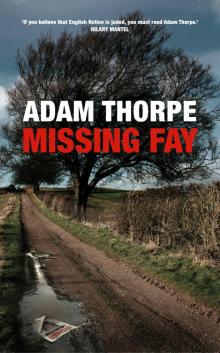 Missing Fay
Missing Fay Hodd
Hodd Pieces of Light
Pieces of Light The Standing Pool
The Standing Pool Ulverton
Ulverton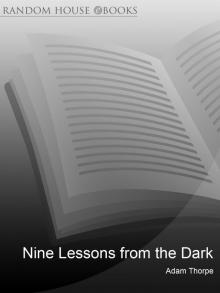 Nine Lessons From the Dark
Nine Lessons From the Dark Flight
Flight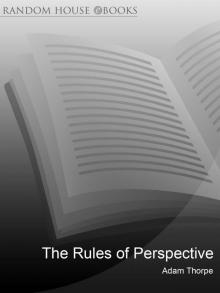 The Rules of Perspective
The Rules of Perspective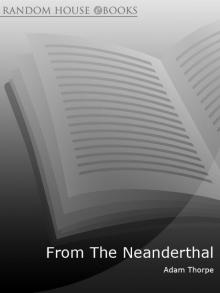 From the Neanderthal
From the Neanderthal Is This the Way You Said?
Is This the Way You Said? Still
Still No Telling
No Telling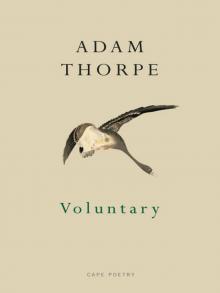 Voluntary
Voluntary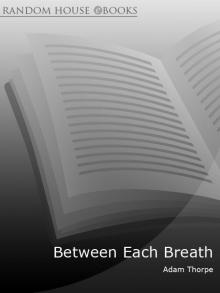 Between Each Breath
Between Each Breath